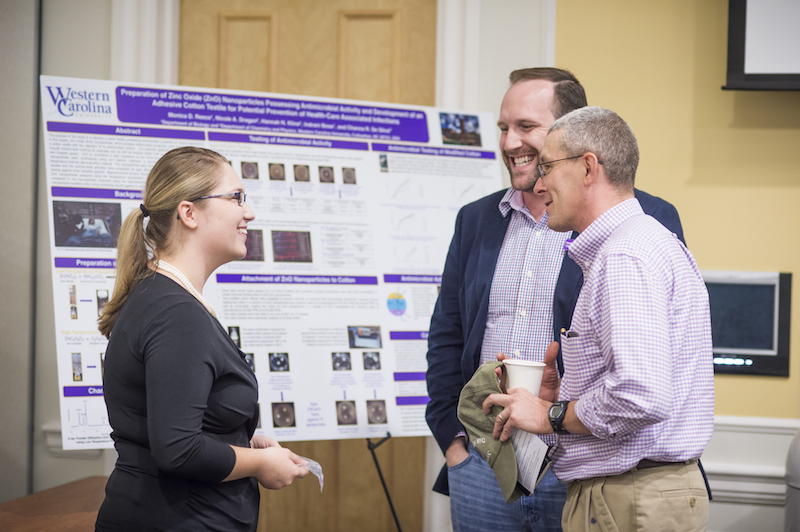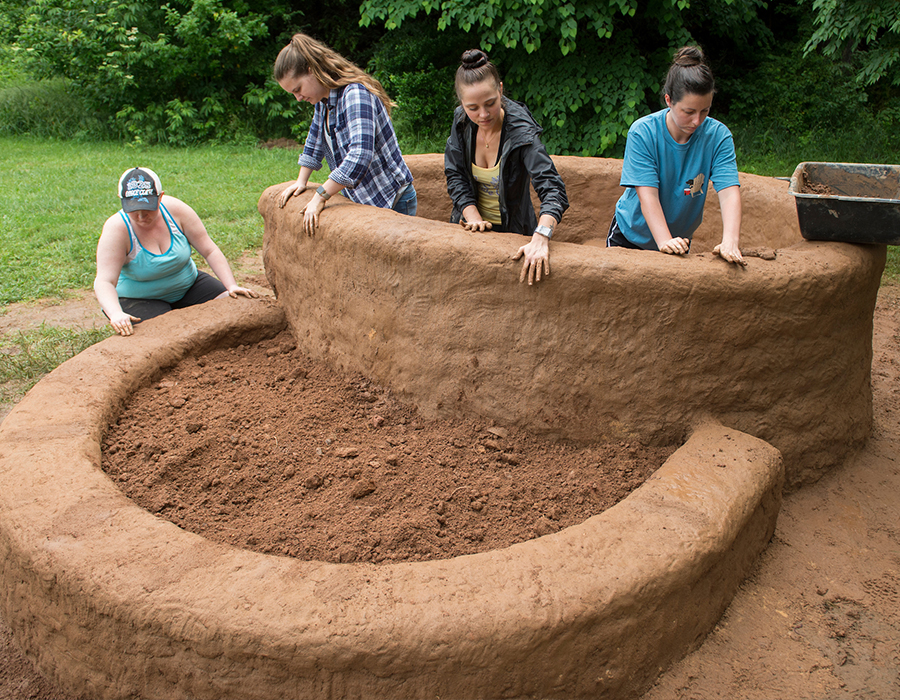- Academic Programs & Support
- Office of the Provost
- Research at WCU
- Undergraduate Research
Undergraduate Research
Western Carolina University has established itself as a national leader in undergraduate research working annually to support students in kick starting, sustaining, and disseminating research, scholarship, and creative activities from across all disciplines.

Monica Reece, Undergraduate Research Student
Undergraduate research and creative inquiry are defined as inquiry or investigation that makes an original intellectual or creative contribution to the discipline. Undergraduate students engaged in research and creative inquiry are making contributions in every department and college on Western's campus.
As undergraduates, students work closely with research and creative teams that are led by our faculty. These faculty are experts in their field and guide students through the research and creative inquiry process.
Why Participate in Research & Creative Inquiry?

Participating in undergraduate research can prepare you for post-graduation plans by expanding your academic experience and giving you the opportunity to explore an academic discipline more fully. Undergraduate research, scholarship, and creative activity are defined as a High Impact Practice (HIP), which can bolster a students academic experience by engaging in the learning process deeply. Students who participate in HIPs like undergraduate research tend to have better academic outcomes and get hands-on experiential opportunities.
Set Yourself Up for Success!
Explore our frequently asked questions below:
- Graduate and Professional School: Undergraduate researchers are more likely to move into graduate programs.
- Academic Achievement: Undergraduate researchers demonstrate higher achievement and are more likely to stay in school.
- Career Goals: Undergraduate research can help you clarify your choice of degree program, career interests, and post-graduation plans.
- Transferable Skills: Undergraduate research strengthens written and oral communication, critical thinking, technical skills, and information literacy.
- Community: Undergraduate research provides opportunities to build a learning community with faculty and fellow students.
- Confidence: Undergraduate research builds confidence in your abilities within the discipline, and improves your overall perception of the discipline.
Want to learn more about becoming an undergraduate researcher? Not sure how to find a faculty member to work with on a research project? Nervous about contacting a faculty member about research? Confused about which programs you qualify for to support your research experience? Getting started can be overwhelming, but we are here to help!
- Take time to outline what you'd like to investigate and/or the discipline you'd want to explore more fully
- Explore which faculty currently teach and/or conduct research related to the topics you outlined
- Reach out to the faculty you feel match most with your research interests (send an email to make an appointment or drop in during their office hours)
- Be prepared! Bring your resume or a list of interests, skills, and your semester schedule to discuss how you might join the faculty research team.
For more guided support in getting started, make an appointment with the Research Programs Coordinator, Suzanne Melton (scmelton@wcu.edu), to collaborate on how to get started.
Suzanne Melton
Research Programs Coordinator
110 Cordelia Camp Building
828.227.2575
Additional Resources

For many professional schools and career positions, you will need letters of recommendation.
Most professional graduate programs and positions require at least three formal letters of recommendation. Job applications often also require references.
Conducting undergraduate research is a way to develop strong relationships with faculty members who can serve as references for you, and write you strong letters of recommendation.

Undergraduate research allows students to engage in unique experiences.
Students work as individuals or in small teams on research and creative projects, ranging in topic and depth. These experiences build strong skill and professional knowledge. Drawing from these experiences can help students stand out during interviews for graduate and professional school programs, as well as the job market.
Undergraduate research gives students a chance to be specific in their interviews about the learning they've engaged in while participating in research or creative projects.

Undergraduate research provides myriad opportunities to expand portfolios or academic resumes.
Undergraduate research students participate in opportunities that include things like presenting their work in a professional setting (both on and off campus), earning scholarships or fellowships, taking course credit, and defending theses and publishing their work.
All of these opportunities can be highlighted on a students’ resume and discussed in cover letters.